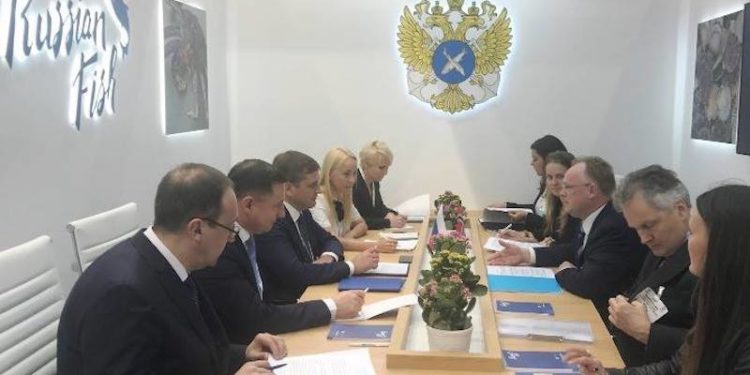Measures taken by Russia and Norway from 2015 to regulate the snow crab fishery have been shown to have been effective in restricting third-country access and blocking IUU activity. Joint efforts in fisheries management were discussed by the Russian and Norwegian fisheries ministers at the Global Seafood Exhibition last week in Brussels.
Russia’s deputy minister for agriculture Ilya Shestakov and Norwegian fisheries minister Per Sandberg met to discuss the results of co-operation on fisheries management.
Ilya Shestakov commented that this year the decision of the two countries after a two-year hiatus to resume capelin fishing in the Barents Sea was successful, with a higher catch than during the last capelin season in 2015.
He put forward the suggestion of considering measures to improve the control and management of fishing activities of third-country vessels in the NEAFC regulatory area in the Barents Sea concerning jointly managed resources, and noted that there has been progress in the implementation of electronic data exchanges.
The two delegations exchanged information on monitoring and results of controls on the opilio crab fishery, noting the effectiveness of measures designed to eliminate illegal production by the third-country vessels. Norway noted that now there are legal proceedings against two vessels that have carried out IUU fishing.
According to research, there is an increase in the stock, and both Ilya Shestakov and Per Sandberg agreed to conduct additional stock assessment, considering the possibility of increasing TAC of this species by half.
They also discussed international regulation of pelagic stocks in the North-East Atlantic, referring to Atlanto-Scandian herring, mackerel and blue whiting.
Ilya Shestakov and Per Sandberg discussed the timing of the preliminary meeting of the co-chairs of the SFS in St. Petersburg and the upcoming session of the Commission. The dialogue will be continued at the meeting of the Ministers of Fisheries of the North Atlantic in August 2018.









